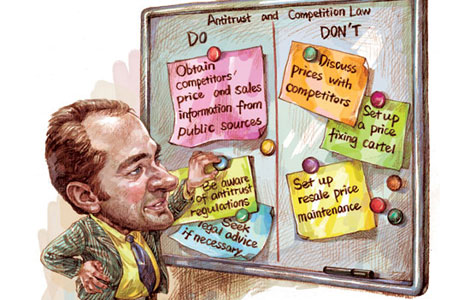Slow motion
Updated: 2013-09-20 15:32
By Andrew Moody (China Daily)
|
|||||||||||
Zhu Ning, deputy director of the Shanghai Advanced Institute of Finance at Shanghai Jiao Tong University, says people were rightly concerned about debt and these fears have not gone away.
"If you look at the way local governments have been able to achieve their economic growth in the past several years, a large part of that has been coming out of infrastructure building.
"One way to look at it is that the investment-driven growth model has been sustainable for the past 20 years but will it be sustainable for the next 20?"
Jian Chang, China economist at Barclays Capital, is one who does not feel the recent more buoyant economic data relating to trade and production fundamentally changes the picture.
"For me the fundamental challenges relating to the Chinese economy have not changed. This includes overcapacity in industry, manufacturing losing competitiveness, a property bubble and you have this financial risk with debt at 200 percent of GDP, combined with a slowing economy that implies rising non-performing loans," she says.
"I think all these things have not changed and for next year I look for downside risks rather than upside improvement."
George Magnus, senior independent economic adviser for UBS, based in London, believes the debt level in the economy could be as high as 250 percent and as he warned in his 2010 book Uprising: Will Emerging Markets Shape or Shake the World Economy? could result in an investment bust that could lead to a sudden stuttering of growth.
"I don't think this alone was ever going to cause the economy to slow down but it is a growing worry and it could lead to a sharp slowdown in the economy since China's credit cycle has now peaked or is close to doing so," he says.
London-based Mark Williams, chief economist of Asia at Capital Economics, was reportedly one of the most bearish forecasters of the Chinese economy last year. He believes growth will come in at 7.5 percent for the full year, in line with the government's own target.
"We had been expecting some pick-up in growth this year. There was a period of deep gloom in the markets early in the summer with many worrying about a crash but given that credit had been expanding at a 20 percent annual pace for a while, it would have been a greater surprise if there hadn't been some form of rebound," he says.
Like Magnus, he remains concerned about the level of debt in the economy.
"It doesn't look as though the debt overhang will trigger an imminent crisis, but China needs to slow the growth of credit to bring risks under control. It is hard to think of any economy in the emerging world that has had a build-up of credit on the scale China is now seeing and not gone on to run into severe difficulties," he says.
China's economic reform agenda is likely to be outlined at a crucial meeting of the Communist Party of China Central Committee in November.
Many observers are looking for measures that might boost consumption such as the reform of the hukou (household) registration system allowing migrant workers to bring their families to urban centers and live a higher spending lifestyle instead of just saving money and remitting it home.
Steps to strengthen China's social safety net, which will give people the confidence to spend and not save, are also seen as vital.
|
Clockwise from top left: Henry Bell, first secretary, economic, at the British Embassy in Beijing; Oliver Barron, head of the China office of London-based China economics research company NSBO; and Zhu Ning, deputy director of the Shanghai Advanced Institute of Finance at Shanghai Jiao Tong University. Photos by Feng Yongbin / China Daily |
Further moves toward interest rate liberalization, seen as vital for the private sector to get finance and better capital allocation, are also anticipated.
What the government intends to do to bolster the service sector and encourage innovation will also be seen as critical.
Zhu at Shanghai Jiao Tong University says a lot of significance is now being placed on any autumn announcements by the top leadership of the Party.
"We are all putting a lot of hope in what is going to come out of the Third Plenary meeting and we are hoping for a great deal of reform and historically these policies always have a big impact on how the economy is going to pan out. I am sort of confident about what is going to happen in November," he says.
Bell at the British Embassy agrees that what the government does will ultimately determine what happens to growth.
"The key variable at the moment is government action; what happens in terms of government economic policy."
He says, however, that according to a recent IMF report, growth is ironically likely to be higher at between 7 and 7.5 percent over the next five years if it takes no action than if it was to implement reforms with growth then slowing to 7 percent by 2018.
"The economic rebalancing model is a more sustainable one. I don't think you should assume that lower Chinese growth is inherently wrong."
Magnus at UBS says that one of his concerns is that the government will be distracted from making the necessary reforms because of the immediate short-term problems it now faces, particularly in relation to excess debt.
"The Third Plenary session may shed some light on what specific measures are in the pipeline. It may be that the need to manage the debt overhang, lower credit creation and address the rising bad loan burden will interfere with progress on reforms," he says.
"Just as in the West, the best time for reform is when things are going well, not when the economic risks are rising."
Leading economists like Paul Krugman have argued recently that China's growth will inevitably fall because it has run out of what he calls "surplus peasants", the supply of people willing to move from the countryside to urban centers.
Today's Top News
Leader calls strategic links with Beijing a model
Maduro aims to build trade plan with China
China to help deal with chemical weapons
Employee claims Danone gave bribes
Court media officers get greater say
Regulation cuts spending on meetings
Nature's light show 'once-in-a-lifetime' trip
Taoists on a mission to promote ancient lore
Hot Topics
Lunar probe , China growth forecasts, Emission rules get tougher, China seen through 'colored lens', International board,
Editor's Picks

|

|

|

|

|

|






